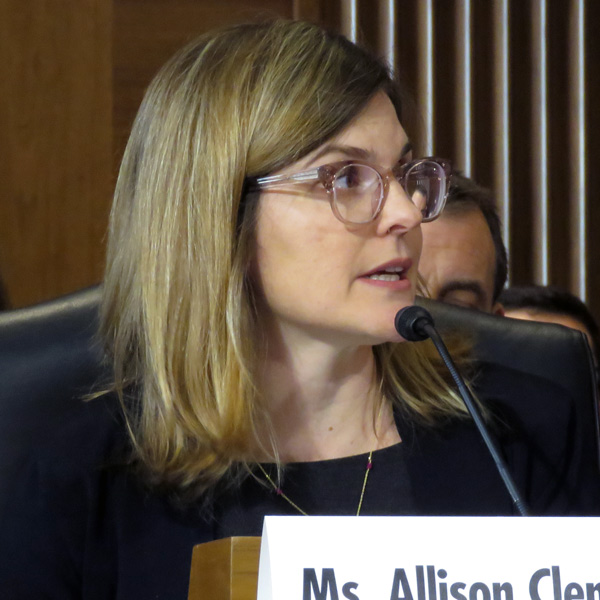FERC Commissioner Allison Clements
” data-credit=”© RTO Insider LLC” style=”display: block; float: none; vertical-align: top; margin: 5px auto; text-align: left; width: 200px;” alt=”Clements-Allison-2018-01-23-RTO-Insider-FI.jpg” align=”left”>FERC Commissioner Allison Clements | © RTO Insider LLC
FERC Commissioner Allison Clements told the ISO-NE Consumer Liaison Group on Wednesday that the country’s energy sector is facing a “system challenge” from a rapidly changing resource mix that requires intelligent transmission planning and investment as part of the energy transition.
Any system problem needs a system solution, said Clements, who is focusing on ensuring that the commission and states work together “to embrace the full portfolio of solutions to unprecedented and formidable challenges.”
Clements said there is a “once-in-a-generation opportunity” to invest in new transmission that can contribute to cost-effective and reliable facilitation of a changing resource mix. When asked about the uncertainty surrounding the New England Clean Energy Connect (NECEC) transmission line, which would supply hydropower from Hydro-Québec to the New England grid through a 20-year supply agreement with Massachusetts utilities, Clements called it a “clear example” of the challenges related to siting new transmission.
On a subsequent panel, Michael Giaimo, Northeast regional director for American Petroleum Institute, said policymakers should not be so quick to retire existing fossil fuel infrastructure.
“My parents taught me that if you leave a job, make sure you have another job,” Giaimo said. “So, the analogy here is if you want to ensure a reliable power system at a minimum, you shouldn’t retire infrastructure until you are certain.”
Given New England’s policies intended to stimulate solar, wind and electrification, Giaimo said the region needs to have resources in times when renewables aren’t available and to account for the increase in nightly load for electric vehicle charging and residential heating. Additionally, he said, it’s essential to consider that existing gas infrastructure can help facilitate low-carbon fuels, like green hydrogen, in the future.
Dale Bryk, director of state and regional policies at the Harvard Environmental and Energy Law Program, said the region “can’t say ‘no’ to things when we don’t have a plan.”
“But we also can’t use the absence of a plan as a weapon to prevent ever changing anything,” Bryk said. “We have to stop digging the hole and stop investments in fossil fuel infrastructure that we know we have to abandon and build the solutions in a timely way so that we do have a just, equitable and orderly transition.”
“This transition is happening,” Clements said. “It’s not the commission’s job to plan it. It’s the commission’s job to facilitate it and protect customers and contribute to the assurance and reliability while it’s happening. That’s exciting. It’s like we’re the underlying nuts and bolts that are allowing the implementation to take place.”



